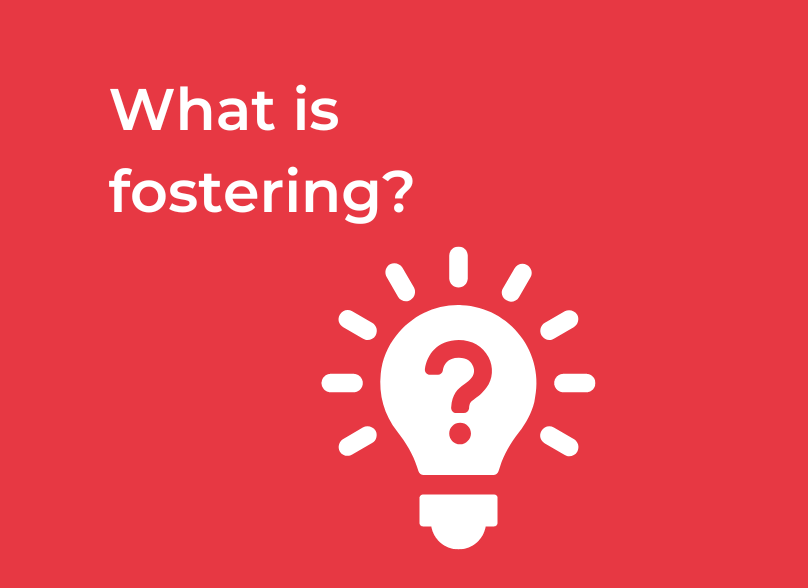What is fostering?



What is fostering?
Fostering refers to providing temporary care for a child or young person unable to live with their birth family. This can be due to various reasons, such as abuse, neglect, parental illness, or incarceration. The goal of foster care is to provide a safe and stable environment for the child while their birth family works towards resolving the issues that led to the child's reason to be placed in care.
Fostering explained
Fostering can be a challenging but rewarding experience, as foster carers play a critical role in helping children and young people in need. It requires patience, understanding, and a commitment to meeting the child's needs.
Every child has a unique history, and each situation has its obstacles - but it is through the loving care of foster carers that these troubles can be turned into successes and opportunities.
The fostering process starts when a child or young adult cannot live with their biological parents. There is no set timeline for when they are placed, this is based on the individual's needs and situation.
In Wales, the local authorities manage the foster care system. To make the process more efficient, they will often use independent fostering agencies, like Calon Cymru Fostering, who manage and support the foster placements for them. As a foster agency, this allows us to form direct connections with the local foster carers, supplying the highest quality assistance and advice and a friendly presence to give help, training and support whenever required. When somebody becomes a foster carer, they will be setting off a chain reaction that affects their lives and those of the young people they will care for.
Why do children come into care?
It's important to note that every child's situation is unique, and coming into care can be a traumatic and challenging experience for them. The goal of foster care is to provide a safe, stable, and supportive home for these children until they can be reunited with their families.
Children come into care for various reasons, and each child's situation is unique. Here are some common reasons why children may come into care:
Neglect or abuse
Some children may come into care because they have experienced neglect or abuse in their family home, and their safety and well-being are at risk.
Parental illness or incapacity
Children may come into care if their parents cannot care for them due to illness, disability, or addiction.
Family breakdown
Children may come into care if their parents are going through a divorce or separation and there is no other suitable family member or friend who can care for them.
Parental imprisonment
Children may come into care if their parent or caregiver is imprisoned and there is no other suitable family member or friend who can care for them.
Homelessness
Children may come into care if their family is homeless or in unsuitable housing.
Special needs
Children with special needs, such as physical or intellectual disabilities, may come into care if their parents cannot provide the necessary care and support.
What is the role of a foster carer?
As a foster carer, you would provide a safe, stable, and nurturing environment for a child or young person. Here are some of the things that a foster carer might be expected to do:
Meet the child's basic needs
This includes providing food, clothing, shelter, and medical care as needed.
Provide emotional support
Foster children may have experienced trauma and may need extra emotional support. Therefore, foster carers should be patient, understanding, and able to provide a caring and stable environment for the child.
Help with schoolwork
Foster carers should ensure that the child attends school regularly and provide assistance with homework and other school-related activities.
Work with the child's social worker
Foster carers should work closely with the child's social worker and other professionals to ensure the child's needs are met.
Attend meetings and appointments
Foster carers may be required to attend meetings with the child's social worker, school, and other professionals involved in the child's care.
Maintain records
Foster carers should keep accurate records of the child's care, including medical appointments, school attendance, and other important information.
Provide a stable and safe home environment
Foster carers should provide a stable and safe home environment for the child, including a safe and comfortable bedroom and access to recreational activities.
Help with reunification
The goal is for the child to be reunited with their birth family. In that case, foster carers will work with the child's social worker and birth family to facilitate a successful reunification when the time is right.
What do I need to know about fostering?
If you are considering becoming a foster carer, here are some things you should know
Foster care is a challenging but rewarding experience
Foster care can be emotionally challenging, but providing a safe and loving home for a child in need can also be incredibly rewarding.
Foster children may have experienced trauma
Many foster children have experienced abuse, neglect, or other forms of trauma and may require extra support and understanding.
Foster care is a temporary arrangement
The goal of foster care is to provide a temporary home for a child while their birth family works towards resolving the issues that led to the child's placement in care. However, in some cases, the child may be placed in long-term foster care, or the goal may change to adoption.
Social workers support foster carers
Foster carers receive support and guidance from social workers and other professionals involved in the child's care.
Foster carers are required to meet specific criteria
To become a foster carer, you must meet specific criteria, such as being over 21 years old, having a spare bedroom, and passing background checks and training.
Foster carers receive financial support
Foster carers receive financial support to cover the child's costs, including allowances for things like clothing and school supplies. A portion of the allowance a foster carer receives is to pay them for their time and dedication to the child in their care.
Foster carers play a vital role in the child's life
Foster carers significantly impact the child's well-being and future and can provide a stable and loving home that the child may not have otherwise.
On this page
Fostering statistics in Wales...
*Correct as of 31st March 2022

4,915 children were living with foster families in Wales

This is 69% of the 7,080 children in care are looked after away from home.

There are approximately 3,800 foster families in Wales

Common questions asked
You must be at least 21 years old to start fostering. There is no upper age limit, age is just a number when it comes to fostering.
To foster, you must have a spare room that they will not have to share with another member of your current household. Sibling placements may share a bedroom on occasion, although this is determined on a case-by-case basis.
You will receive advice and information from one of our team during your initial phone contact. When you are ready, you will be assigned a dedicated assessor who will visit you and assist you throughout the entire process. A referee, medical, and DBS check will be done, and you will be asked to undergo a 'Skills to Foster' training session. The assessment process typically takes 4-6 months.
Do you think you can change the life of a local vulnerable child or young person?
Get in touch today for a casual, friendly chat with our experienced foster advisors.
Contact us

